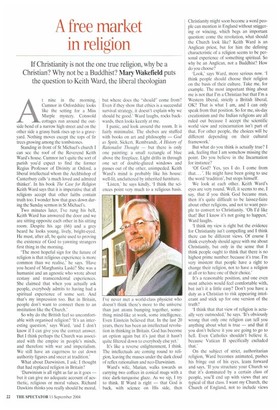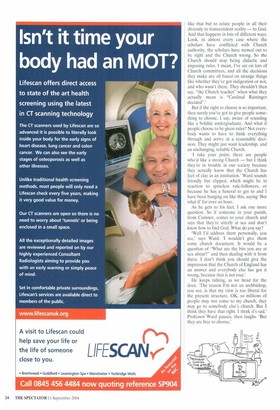A free market in religion
If Christianity is not the one true religion, why be a Christian? Why not be a Buddhist? Mary Wakefield puts the question to Keith Ward, the liberal theologian At nine in the morning, Cumnor in Oxfordshire looks like the setting for a Miss Marple mystery. Cotswold cottages run around the outside bend of a narrow high street and on the other side a grassy bank rises up to a graveyard. Nothing moves except the tops of fir trees growing among the tombstones.
Standing in front of St Michael's church I can see the roof of the Reverend Keith Ward's house. Cumnor isn't quite the sort of parish you'd expect to find the former Regius Professor of Divinity at Oxford, a liberal intellectual whom the Archbishop of Canterbury calls 'a much loved and admired thinker'. In his book The Case for Religion Keith Ward says that it is imperative that all religions accept that other faiths contain truth too. I wonder how that goes down during the Sunday sermon in St Michael's.
Two minutes later, I've rung his bell, Keith Ward has answered the door and we are sitting opposite each other in his sitting room. Despite his age (66) and a grey beard he looks young, lively, bright-eyed. He must, after all, be quite used to proving the existence of God to yawning strangers first thing in the morning.
'The most hopeful sign for the future of religion is that religious experience is more common than we realise,' he says. 'Have you heard of Marghanita Laski? She was a humanist and an agnostic who wrote about ecstasy and transcendental experiences. She claimed that when you actually ask people, everybody admits to having had a spiritual experience of some sort. And that's my impression too. But in Britain, people don't want to connect them to an institution like the Church.'
So why do the British feel so uncomfortable with organised religion? 'It's an interesting question,' says Ward, 'and I don't know if I can give you the correct answer. But I think perhaps the Church was associated with the empire in people's minds, and therefore with war and imperialism. We still have an eagerness to cut down authority figures and sneer at tradition.'
What about Darwinism, I ask; I thought that had replaced religion in Britain?
'Darwinism is all right as far as it goes — but it can give no adequate account of aesthetic, religious or moral values. Richard Dawkins thinks you really should be moral, but where does the "should" come from? Even if they show that ethics is a successful survival strategy, it doesn't explain why we should be good.' Ward laughs, rocks backwards, then looks keenly at me.
I panic, and look around the room. It is fairly minimalist. The shelves are stuffed with books on art and philosophy — God as Spirit, Sickert, Rembrandt, A History of Rationalist Thought — but there is only one painting: a small rectangle of blue above the fireplace. Light drifts in through one set of double-glazed windows and passes out of the other, unimpeded. Keith Ward's mind is probably like his house: well-lit, uncluttered by inherited furniture.
'Listen,' he says kindly, 'I think the sciences point very much to a religious basis.
I've never met a world-class physicist who doesn't think there's more to the universe than just atoms bumping together, something mind-like at work, some intelligence. Even Einstein believed that. In the last 20 years, there has been an intellectual revolution in thinking in Britain. God has become an option again but it's just that it hasn't quite filtered down to everybody else yet.'
It's like a reverse enlightenment, I think. The intellectuals are coming round to religion, leaving the masses under the dark cloud of reflex rationalism and neo-Darwinism.
Ward's wife, Marian, walks towards us carrying two coffees in conical mugs with a nice dark-turquoise glaze. As we sip, I try to think. If Ward is right — that God is back, with science on His side, then Christianity might soon become a word people can mention in England without sniggering or wincing, which begs an important question: come the revolution, what should the Church look like? Keith Ward is an Anglican priest, but for him the defining characteristic of a religion seems to be personal experience of something spiritual. So why be an Anglican, not a Buddhist? How do you choose?
'Look,' says Ward, more serious now. 'I think people should choose their religion on the basis of their culture. Take me, for example. The most important thing about me is not that I'm a Christian but that I'm a Western liberal, strictly a British liberal, OK? That is what I am, and I can only speak from that position. So for me, six-day creationism and the Indian religions are all ruled out because I accept the scientific world view and reincarnation isn't part of that. For other people, the choices will be different depending on their cultural framework.'
But what do you think is actually true? I ask, feeling that I am somehow missing the point. Do you believe in the Incarnation for instance?
'Of God? Yes, yes I do. I come from that... '. He might have been going to use the word 'tradition', but stops himself.
We look at each other. Keith Ward's eyes are very round. Well, it seems to me, I say, that if you think God became man, then it's quite difficult to be laissez-faire about other religions, and not to want people to convert to Christianity. 'Oh I'd like that! But I know it's not going to happen,' Ward laughs.
'I think my view is right but the evidence for Christianity isn't compelling and I think there can be different views. Of course I think everybody should agree with me about Christianity, but only in the sense that I think people ought to think that there is no highest prime number: because it's true. I'm very insistent that people have a right to change their religion, not to have a religion at all or to have one of their choice.'
It's a reasonable position, and one even most atheists would feel comfortable with, but isn't it a little easy? Don't you have a duty as a Christian to risk appearing intolerant and stick up for one version of the truth?
'I think that that view of religion is actually very outmoded,' he says. 'It's obviously wrong that only one religion can tell you anything about what is true — and that if you don't believe it you are going to go to hell. Even Catholics shouldn't believe it, because Vatican II specifically excluded that.'
On the subject of strict, authoritarian religion, Ward becomes animated, pushes his fringe out of his eyes, leans forward and says, 'If you structure your Church so that it's dominated by a certain class of people, you'll end up with views that are typical of that class. I want my Church, the Church of England, not to include views
like that but to relate people in all their diversity to transcendent reality — to God. And that happens in lots of different ways. Look, in almost every case where the scholars have conflicted with Church authority, the scholars have turned out to be right and the Church wrong. So the Church should stop being didactic and imposing rules. I mean, I've sat on lots of Church committees, and all the decisions they make are all based on strange things like whether they've got indigestion or not, and who wasn't there. They shouldn't then say, "the Church teaches" when what they actually mean is "Cardinal Ratzinger decided".'
But if the right to choose is so important, then surely you've got to give people something to choose, I say, aware of sounding like a bolshie undergraduate. And what if people choose to be given rules? Not everybody wants to have to think everything through and arrive at a reasonable deci,,ion. They might just want leadership, and an unchanging, reliable Church.
'I take your point; there are people who'd like a strong Church — but I think they're in trouble in our society because they actually know that the Church has feet of clay as an institution.' Ward sounds friendly but clipped, which might be in reaction to spineless rule-followers, or because he has a funeral to get to and I have been banging on like this, saying But what if' for over an hour.
As he gets to his feet, I ask one more question. So if someone in your parish, from Cumnor, comes to your church and says that they're utterly at sea and don't know how to find God. What do you say?
'Well I'd address them personally, you see,' says Ward. 'I wouldn't give them some church document. It would be a question of "What are the bits you are at sea about?" and then dealing with it from there. I don't think you should give the impression that the Church of England has an answer and everybody else has got it wrong, because that is not true.'
He keeps talking, as we head for the door. The reason I'm not an archbishop, you see, is that my view is too liberal for the present structure. OK, so millions of people may not come to my church, they may go to somebody else's church. But I think they have that right. I think it's sad.' Professor Ward pauses, then laughs. `But they are free to choose.'











































































 Previous page
Previous page